Played by costumed members of Troy Camp and others, Homer, characters from the Trojan War, and a host of Greek deities will guide visitors and complement the horse’s inherent interactivity with a blend of erudition, flair, wit, humor, and drama.
Our players will be able, if they choose, to interact with Burners by guiding visitors around the horse and encouraging their response to it (art and writing tools provided) and by telling “their” story to visitors, especially children. Players will also be part of the grand procession on Friday when the Horse will be transported to its place of immolation. This event will be filmed from the air and the playa and be the climax of a documentary about doing a project for Burning Man.
We are looking for performers to play the following parts and will be casting more than one person for each role. Go to the Casting Call page to volunteer.
The Trojan War Characters
AchillesKing of the Myrmidons. Greatest of all warriors on earth, brooding, half-divine son of Thetis and Peleus; it is his anger that sets the events of the Iliad in motion; inspiration of Alexander the Great; killed by Paris and Achilles’ own choice for a short life of glory, as opposed to a long life in obscurity. Later, when Odysseus meets him in Hades, he seems to regret that decision. Father of Neoptolemos. Kills Hector. |
 |
AeneasSon of Aphrodite, he is a great Trojan general and friend to Hektor and Paris. Through the goddess’ protection, Aeneas escapes Troy as it burns with his aging father and son; he travels to Italy and wins land there through much suffering, and is the ancient ancestor of the Roman people; his epic, the Aenead, closely follows the tribulations of Homer’s great epics. |
|
AgamemnonGreatest of the Greek lords, king of Mycenae, brother to Menelaus and part of the cursed Atredeides family. Arrogant and opulent, he killed his daughter Iphegenia at the port Aulis to appease the winds that were keeping them from sailing to Troy; killed by his wife Clytemnestra upon return to Mycenae |
 |
AjaxThere are two Ajax’s: Telemonian and Locrian. They are the two largest, most intimidating fighters; after the Fall of Troy, they rape Cassandra in Athene’s temple and both die terrible deaths on the way home. |
|
AmazonsThere is very little consensus on the origins of these mysterious tribes; the myth tells us that wherever they lived, no men were allowed to cross the borders. The Amazons were a fierce warrior people distinguished by the fact that they were all women. Their cunning archers would slice off one breast to make drawing the bow easier. They have caused trouble for the Greeks since time immemorial, joining the Trojan cause after the death of Hektor, and climbing the rocks of the Acropolis to burn the original Parthenon with the Persians. They are mysterious and absolutely terrifying. |
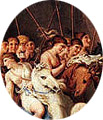 |
BriseisBeautiful Trojan woman taken captive by Achilles, she is then taken by Agamemnon, inciting the wrath of Achilleus and therefore the Iliad. Agamemnon, eventually, gives her back, and she ends up taking a boat to Sparta with Menelaus at the end of the war. |
|
CassandraThe raving and ravishing Cassandra, whose name in Greek means ”she who entangles men” was the daughter of King Priam and Queen Hecuba of Troy. Her beauty caused Apollo to grant her the gift of prophecy. However, when she did not return his love, Apollo placed a curse on her so that no one would ever believe her predictions. |
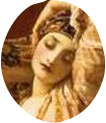 |
HecubaWife of Priam, the even-minded queen of Troy had a dream before Paris was born that she would give birth to the death of Troy through fire. She is taken by Odysseus as a slave, but, at the sight of her slain children, she becomes mad; her wailing was that of a dog howling at the moon, so Hera transforms her into a dog, which then jumps off the ship of Odysseus and drowns. |
|
HectorOldest son of Priam and heir to the great throne of Troy, Hector is the besieged city’s greatest warrior. He is killed by Achilles after his troops retreat into the city at the site of a fully armed and bloodthirsty son of Thetis. His death is the turning point of the ten year war. Achilles mutilates Hector’s corpse by dragging it around the walls of Troy, and later shows mercy to Priam by giving the king Hector’s body for a proper burial. Hector is Homer’s interpretation of the ideal warrior. |
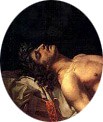 |
HelenA mortal of fabled beauty and the cause of the Trojan War after Paris abducted her from Sparta and bore her triumphantly home to Troy. During the week, we hope to attract several Helens to play the role in our dramatics. On Friday afternoon, however, we will have a Helen of Troy contest to find the one Burner who bears the face that might have launched a thousand ships. |
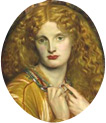 |
LaocoonProphet of Troy who warns the soldiers to destroy the horse, or at least not to accept it; he and his two sons are ripped apart by Athene’s serpents on the shores of the sea. |
|
MenelausKing of Sparta, brother to Agamemnon, and husband to Helen; he called in an oath from the other Greek lords that resulted in the 1000-ship armada; red-haired and kind, a great warrior. He makes it back intact from Troy with Helen, and lives happily ever after. One of the few. |
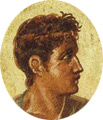 |
NeoptolemosAlso known as Phyrrus, he is the son of Achilles, and kills Priam, King of Troy. |
|
OdysseusKing of Ithaca, he is the cleverest of all the Greeks; though renowned for his valour in battle, he is mostly remembered by his sharp mind and diplomatic skills; favorite of Athene, he has his own epic tale, and was the mastermind behind the Trojan Horse. |
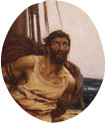 |
ParisSon of Priam, the most beautiful man alive; gave Eris’ Golden Apple to Aphrodite, who gave him Helen in exchange. It is his theft of Helen from Menelaus that sparks the Trojan War. He is weak in battle, lovestruck, and is killed by Menelaus, which makes sense. |
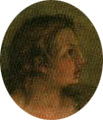 |
PatroclosKing of Opus, descendant of Argonauts, and close friend, some say lover, of Achilles, he is killed by Hector when he dons Achilles’ armor, thus riling Achilles up enough that he returned to battle to kill Hector. |
|
PenthesileaAmazonian warrior-queen, daughter of Ares, who came to the Trojan’s aid near the end of the war (the night after Hector’s funeral) on account of a wish to die in battle. Achilles was smitten with her because she was beautiful and also nearly a match for him in battle. He also killed her. |
|
PriamKing of Troy and son of Laomedon; once narrowly escaped a fight with Heracles by giving him a veil; wise and courageous, killed by Neoptolemos. |
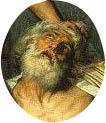 |
The Greek Gods
AphroditeBorn fully mature from the admixture of Mediterranean sea foam and the severed genitals of Uranos the primal sky god, Aphrodite’s reign as the personification of the sexual act has won her many lovers and many enemies. Wife of crippled Hephaestos, lover of violent Ares, she is judged by Paris to be “Kalliste,” the fairest, and thus sets in motion the events of the Trojan War. Her translucent robes constantly slip off and the curls of her oiled hair are perfumed and intoxicating; she is irresistible. |
|
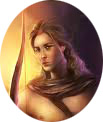 |
ApolloInfinitely beautiful, eternal young, brilliant Apollo presides over archery, music, medicine, and prophesy; he is graceful, cruel, and fiercely protective of his family. He ranges the wide world over, amorously pursuing mortal men and women with mixed results. He is the divine manifestation of the Golden Mean, and brings grace to the strength of the gods. It is his divinity that the Oracle at Delphi mediates in her glossolalic stupor. |
AresThe bronze-helmed lord of the dogs of war embodies the strength and valor on the battlefield that form the core of archaic Greek philosophy. He is conniving, though, and quick to anger; he is generally distrusted by the rest of the Olympians, with the shining exception of Aphrodite, who cannot resist his restless thirst for blood. He has been spotted fleetingly by mortals as he drives his chariot, whipping his flaming stallions into a murderous furor. |
|
 |
ArtemisThe goddess of the hunt, twin sister of Apollo, guards her purity as ardently as a pack of hunting dogs protect their mistress; as the moon goddess, she illuminates the night and, with her retinue of dryads, wanders the palely lit forest wilderness. A protectress of childbirth and chastity, she also presides over the world of contradictions. It was she who demanded the blood of Agamemnon’s daughter to appease the winds, allowing the Greeks to sail to Troy. |
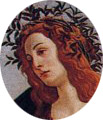 |
AtheneThe shrewd companion of heroes, Athena sprung fully formed and armed from the head of Zeus himself, and thus is the goddess of wisdom. She is carries a spear, her father’s helm, and an aegis shield with the face of a gorgon on the breastplate. She is the goddess of strategy and warfare, as well as the protectress of cities; she resides over civilization as if it were her mystery rite. |
CharonWhen you die and arrive on the near shores of the Underworld, hope that those you left behind buried you with a coin in your mouth; Charon, the ferryman of the fiery river Styx requires correct fare for a ride on his boat to the far and shadowy shores. His gaze is a cataractal blankness. |
|
DemeterPerhaps the most cabalistic of the Olympic gods, Demeter is the fertility goddess. Her power is that of the civilizing influence of agriculture. She is associated with the feminine power of the moon, and has the ability to cease the progress of the seasons. Her daughter by Poseidon is Persephone whose consort is Hades. Demeter’s mystery rites at Eleusis are renowned as the closest thing to the divine that a human can experience, and its secrets are heavily guarded |
|
 |
DionysusLord of the vine, of revelry, and of theatre, twice-born Dionysos is a rural divinity whose cult worships the ecstasy of madness. He is a foreigner to Mt. Olympos, exceptionally attractive, and is depicted both as a heavily bearded man and a lithe, androgynous youth. He can imbue inanimate objects with life, and aids the living to commune with the dead through blood offering. He travels with a wild retinue of crazed maenads, lusty satyrs, and playful nymphs. |
ErisWinged goddess of discord; initiated Trojan War by forcing the Judgment of Paris |
|
ErebosPredating the Olympians and the Titans, Erebos is the primal god of the deepest darkness. Born asexually from Chaos and darkness itself, he is also known as Tartarus, which is the shadow that pervades the nowhere space between the living and the Houses of the Dead. He married his sister Nyx, primal goddess of the night, and fathered many important deities, including Day and Sky and the three Fates. |
|
HadesHades presides over the Houses of the Dead, but is not an inherently evil or malicious god. Instead, he is passive, even altruistic, showing his wrath only when his subjects (the Dead) attempt to escape. He is the older brother of Zeus and Poseidon, with whom he defeated the Titans for dominion of the earth, the sea, and the underworld. His dark helm, given to him by the Cyclopes, renders the wearer invisible, so the Lord of the Underworld may be walking among us yet. |
|
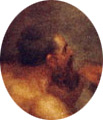 |
HephaestosThrown from Mt. Olympos in disgust by Hera, Hephaestos was maimed and disfigured by his divine tumble. Despite his wretched appearance, his numinous skill in the forge earned him much worship among the craftsmen of the ancient world. Cuckolded by his wife Aphrodite, Hephaestos tried unsuccessfully to rape Athene which resulted in the autocthonic birth of one of Athens’ first kings, Erichthonios. |
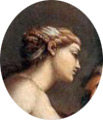 |
HeraHera, queen of the Gods and protectress of marriage, possesses a more ancient divinity than that of her oft-philandering husband and brother Zeus; her significance reaches back to the pre-Greek matriarchal societies. Her symbols, the pomegranate and the poppy seed, represent the power and fertility of primal female forces. She is quick to be outraged and her retribution is pitiless. |
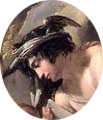 |
HermesAs a child, Hermes stole the immortal cattle of Apollo, invented the lyre, and performed one of the very first sacrifices. A psychopomp, Hermes is the escort to the Underworld; he is the divine protector of travelers and messengers, as well as of thieves and scoundrels. He is the father of Pan, and had an androgynous child with Aphrodite (Hermaphroditus). Often abroad from Mt. Olympus, Hermes is found running along gusts of wind to lend a hand to questionable characters in need. |
NemesisPredating the Olymian gods, Nemesis is the daughter of Erebus and Nyx. She is the inexorable force of divine retribution, the winged harbinger of the judgment of hubris. She carries a sword and a set of scales, but do not confuse her with the modern depiction of “Justice”, for she is not blind; she sees far and clearly. Some stories say it was she who laid the pair of eggs that hatched Castor and Pollox from one, and the infamous Helen and Klytemnestra from the other. |
|
 |
NyxThe primordial goddess of night, Nyx was the child of Chaos and the mother of Death, She was also the mother of Doom, Deceit, Blame, Madness, Misery, the Fates, and Nemesis. Nyx was known for her remarkable beauty and awesome power. Homer called her “the subduer of men and gods.” It’s no wonder that even Zeus stood in awe of her. |
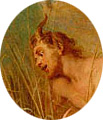 |
PanGoat-legged, pipe-playing, forest-wandering Pan! Pan is a fertility god of the rural persuasion, evinced by his similarity to the pastoral goat. His curving horns swing through the thick summer air, his cloven hooves stomp the ground lustily, and he is ever-quick to chase a maiden or strapping young lad. His lascivious nature, lecherous behavior, and goat-like appearance account for his association with the Christian Devil in later ages; he is the only god who is said to have died. |
 |
PoseidonBrother of Hades and Zeus, great Poseidon is the earth-shaker, the lord of the untamed seas, and patron horses. His anger is inscrutable and easily raised. In the age of the Trojan War, his name is mentioned much more than his sky-god brother, Zeus, as it was a time of earthquakes, floods, and seafaring. Bearded and carrying a fearsome trident, Posiedon arises from the depths of the wine-dark sea only rarely. |
ThetisThetis is a water goddess with silver feet; she is one of fifty Nereids, daughters of an ancient being who had the ability to change shape. Her worship dates to before the age of the Trojan War. In Archaic Greece, she was worshiped as a divinity of the dawn and of rivers. It was she who helped Hephaestos back to Mt. Olympos after Hera mercilessly flung him down. It is her marriage to the mortal Peleus that instigates the Trojan War. Thetis is also the mother of the great warrior Achilles. |
|
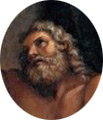 |
ZeusKing of the gods, wreathed in lightning, Zeus is the lord of the sky and ultimate master of the earth. With his brothers Hades and Poseidon, he overthrew the Titans, put them in chains, and locked them away until the end of time. He is in love with many women and takes them as he wished; he can take many forms to seduce unwilling ladies: a bull, a swan, a shower of golden coins, etc. He is the ultimate arbiter between men and the gods. |
Other Divine Creatures
Maenads
translates as “the raving ones”, crazed females in the retinue of Dionysos; semi-nude, wild-haired, sexually hungry; sometimes cannibalistic, eaters of raw flesh; worshipers of Dionysos would aspire to become true, divine Maenads for the length of the mystery rite
Sybmbol: Thrysus staff
Satyrs
debaucherous male members of the Dionysian retinue; long, pointed ears, long fluffy tails, and mighty, mighty beards; sylvan, mountainous, and rural dwellers, fertility symbols; not until Roman times did they acquire goat-like attributes
Symbol: Thrysus staff
Nymphs
Minor female deities of nature, playful, shy, and waif-like; classified by their types of dwelling (Aurae=breezes; Pleides=the constellation; Hesperides=the West; Dryads=the trees; Nereids=Rivers and lagoons; Oereads= Mountains…this list goes on and on…)
Symbols vary
Moirae
The three Fates, white-robed manifestation of Destiny; sisters: Lachesis “Alotter”; Clotho “Spinner” and Atropos “Unturning”; even the Gods are afraid of them; daughters of Nyx
Symbols: Spinning tool, thread, and scissors or blade
Detailed character description
The Storyteller
HomerAlthough blind, Homer saw deeply into humanity and rendered his vision in such epic works as the Odyssey and the Iliad, considered the oldest works of Western literature. The Iliad actually takes its name from Troy, also known as Ilion. Homer will regale the citizens of Black Rock City with tales of the Trojan War, making sure they hear them right from the horse’s mouth. |
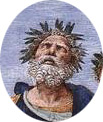 |
